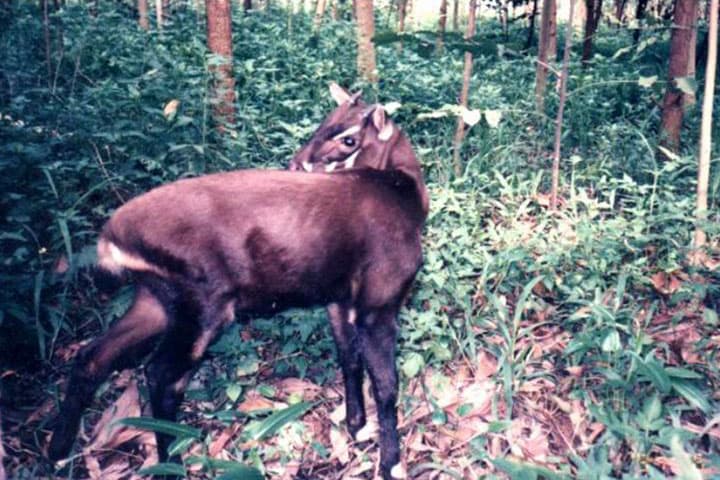Advertisement
Searching For 'The Last Unicorn'
ResumeWith guest host Jane Clayson.
Endangered species and the search for one of the world’s rarest creatures deep into the wilds of central Laos.

Conservationist and author Bill deBuys embarked on a grueling journey through the Laotian jungle in search of the Saola.The elusive, magical horned animal is in full retreat in what remains of its habitats. Trying to escape poachers’ traps and nets set for more desired creatures. Ones that bring in big profits: the Rhinoceros. Turtle blood, Elephant tusks. Tiger bones. The world’s most magnificent beasts on the verge of decimation. Perhaps, extinction. It’s a brutal story, told with passion and purpose. This hour On Point: "The Last Unicorn: A Search for One of the Earth’s Rarest Creatures."
-- Jane Clayson
Guests
William DeBuys, Conservationist and author of "The Last Unicorn: A Search for One of Earth's Rarest Creatures."
Azzedine Downes, CEO of the International Fund for Animal Welfare. (@AzzedineTDownes)
Shivani Bhalla, founder and executive director, Ewaso Lions.
From The Reading List
New York Times: Republic of Congo Signal a Turn in Poaching Fight - "The Convention on International Trade in Endangered Species of Wild Fauna and Flora has identified the Republic of Congo as having a historically poor record on the issue, citing a lack of well-equipped and well-trained managers to protect elephants in the field; inadequate security at government stockpiles; a lack of aggressive prosecution in the courts; and, most important, corruption and a lack of oversight on the transportation of seized materials. But government officials have been working to change that."
The Guardian: Cambodia forest communities confront illegal loggers as authorities look away - "For the countries that border the Arctic Ocean— Russia, the United States, Canada, Norway, and Denmark (through its territory of Greenland)—an accessible ocean means new opportunities. And for the states that have their sights set on the Lomonosov Ridge—possibly all five Arctic Ocean neighbors but the United States—an open ocean means access to much of the North Pole’s largesse. First, though, they must prove to the United Nations that the access is rightfully theirs. Because that process could take years, if not decades, these countries could clash in the meantime, especially as they quietly send in soldiers, spies, and scientists to collect information on one of the planet’s most hostile pieces of real estate."
CNN: Trophy hunting: 'Killing animals to save them is not conservation' - "Killing endangered wildlife to save it is just wrong. It does not make sense morally, economically, biologically, or from a conservation-incentive point of view. It is a philosophy that has no place in modern conservation. And even though it is Americans who constitute a major percentage of the world's trophy hunters, this small, wealthy club of big game sport hunters do not embrace the values of the vast majority of other Americans who appreciate the many non-exploitative values of wild animals. For example, a Synovate eNation poll in 2011 found that of those responding to its survey, 70.4% of Americans would pay to view lions on an African safari, while only 6.6% would pay to hunt them."
Read An Excerpt Of "The Last Unicorn" By William DeBuys
This program aired on May 26, 2015.